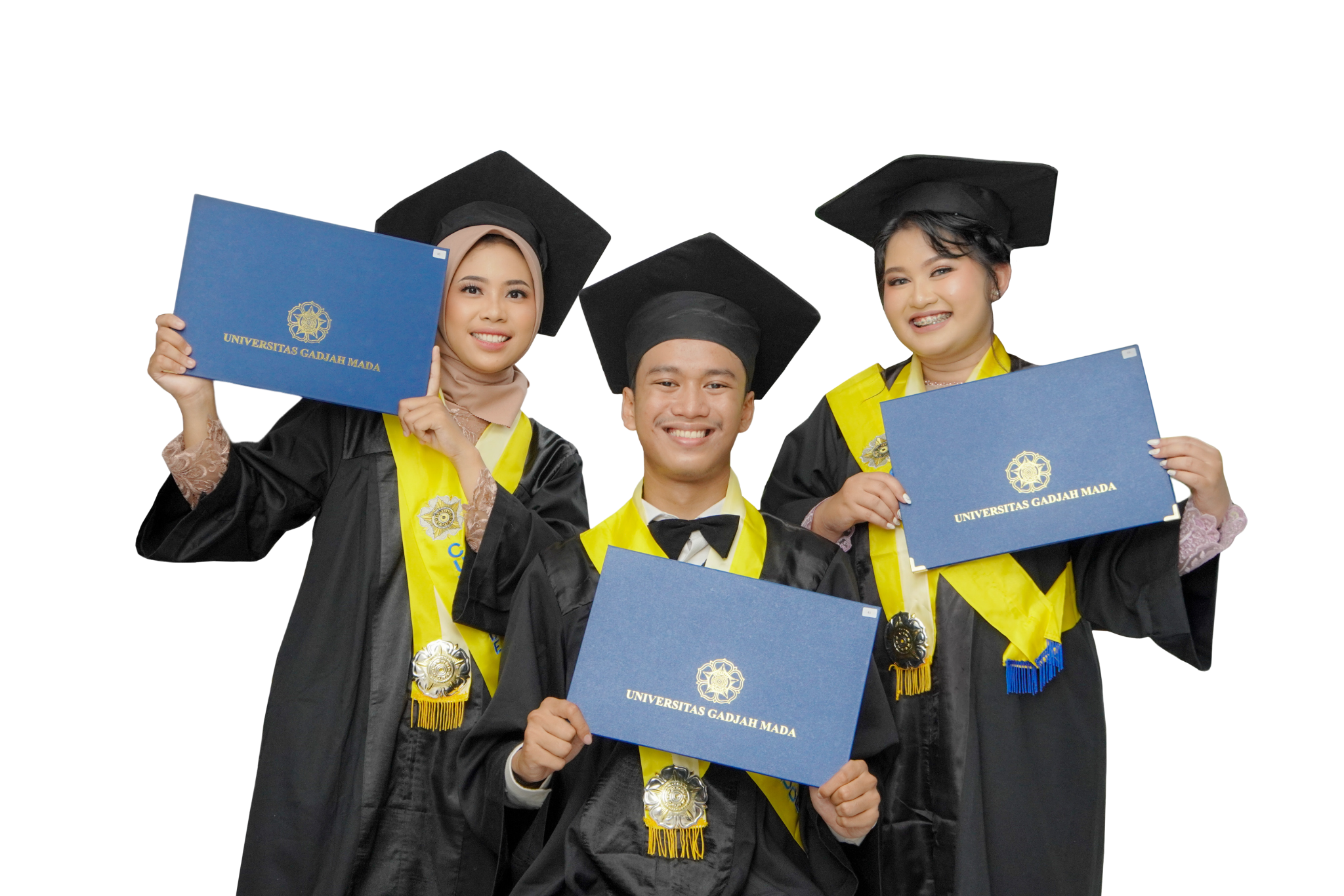
The Bachelor of Public Policy and Management (PPM) program aims to prepare students to develop the skills and abilities needed to address the challenges faced by public policy makers and managers. Through this program, students will be given the opportunity to explore the theoretical and empirical issues faced by actors in the public and private sectors.

PROGRAM
INTERNATIONAL
The International Undergraduate Program in the Department of Public Policy and Management Program (DPPM), or commonly abbreviated as IUP-PPM, is an international version of our undergraduate program. This program is aimed to create globally minded and internationally qualified students. The courses in this program will be delivered in English by competent professors with strong academic backgrounds. Furthermore, IUP-PPM facilitates and provides opportunities for each of its students to experience international exposure through various means and interact with international students in Universitas Gadjah Mada.
IUP PPM is the first public policy management program in Indonesia that has been accredited by AUN (ASEAN University Network) at Program Level under the umbrella of ASEAN-QA. It reaffirms the quality of education we are providing, not only in Indonesia but also in ASEAN standards. The program is purposefully designed to respond to new challenges on public administration in local and national, as well as global level, and aims at arming students with knowledge and skills in three main areas, namely Governance and Public Policy, Public Management and Innovation, and International Development and Policy.

IUP in PPM offers student opportunities to experience international exposure through one of the following tracks:
In addition:
The admission to IUP is separated from regular programs admission (SNBP/SNBT and UM UGM), the complete information about IUP admission can be accessed through the admission section tab.
UGM aims to provide greater opportunities for those interested in studying at its undergraduate programs. Therefore, in the Gadjah Mada University admission, any applicant accepted and proceeded with their registration at an IUP cannot be accepted in regular program in UGM through SNBP or any of the other pathways (UM UGM PBU and/or UM UGM CBT).
| ACTIVITY | INTAKE 1 | INTAKE 2 | INTAKE 3 |
|---|---|---|---|
| Registration | Jan 14 – Feb 18, 2025 (15.00 WIB) | Apr 10 – May 14, 2025 (15.00 WIB) | Jun 17 – Jul 21, 2025 (15.00 WIB) |
| Admission Test | Thursday-Sunday, | Thursday-Sunday, May 22-25, 2025 (Online) | Thursday-Sunday, Jul 24-27, 2025 (Offline) |
| Announcement | Thursday, Mar 6 2025 | Wednesday, Jun 4 2025 | Tuesday, Jul 29 2025 |
Day 1 :
1. Gadjah Mada Scholastic Test (GMST)
2. Academic English Proficiency Test (AcEPT) UGM (if applicant could not submit any English Certificate during the application period)
Day 2 :
(For those who pass GMST and AcEPT/TOEFL ITP/TOEFL IBT/IELTS)
a) Essay Writing
b) Interview
For applicants who graduated in 2023 & 2024 | For applicants who will Graduated in 2025 | Format |
|---|---|---|
| Colored photograph with white background. | Colored photograph with white background. | .JPG |
| High school graduation certificate or SAT/A-Level/ International Baccalaureate or equivalent certificate. | Certificate of Enrollment from current high school. | |
| High school academic report from grade 10 to 12. | High school academic report from grade 10 to 11 and the first semester of grade 12. | |
| Family Card. | Family Card. | |
| ID (SIM/KTP/Passport/Student card). | ID (SIM/KTP/Passport/Student card) | |
| A valid certificate of English proficiency (Please refer to the Requirements Eligibilities number 4) | A valid certificate of English proficiency (Please refer to the Admission Requirements number 4) | |
| Statement of Document Authenticity: (Download here). | Statement of Document Authenticity: (Download here). |
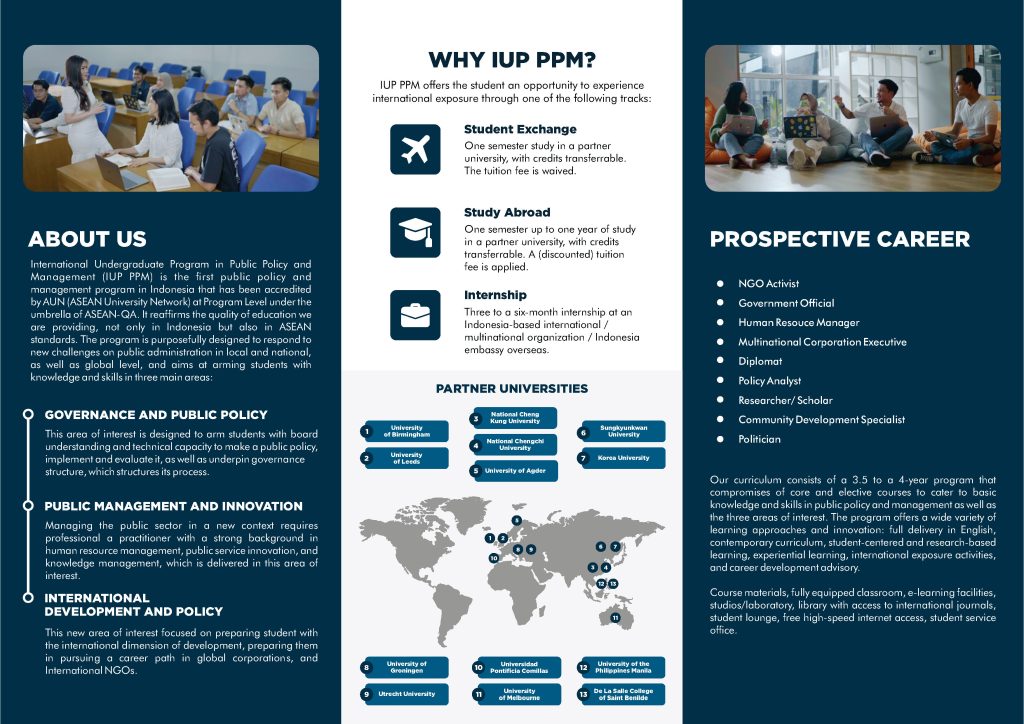
Study Plan IUP 2024: View Guide Book

PROGRAM
REGULAR
Undergraduate Program in Public Policy and Management and (PPM/MKP) UGM is a pioneer of educational institutions in the field of public administration in Indonesia. PPM UGM offers a number of educational programs that aim to produce quality graduates who have theoretical and practical competencies not only in the field of public administration, but also public policy analysis and public management activities. PPM has a vision to become an internationally recognized educational and research institution in the field of public policy and management. Under the Faculty of Social and Political Sciences guided by the vision of “Committed to Science for Better Society“, PPM is determined to organize undergraduate education for “Strengthening Democratic Public Governance“. The graduates of the MKP undergraduate study program have the title of Bachelor of Political Science (S.I.P).
The PPM Undergraduate Program has several expected outcomes such as understanding the concept of academic integrity in general and the concept of plagiarism in particular, gaining knowledge to manage public and non-public organizations, understanding the concept of building networks across government, private, and social institutions, understanding the characteristics of actors in building networks, and understanding the concept of public interest values in public and non-public organizations. The PPM Regular program has developed many courses that are intended to equip students with intermediate level knowledge and skills.
There are 4 registration options that can be followed by prospective students Study Program of PPM UGM (Regular):
Registration Schedule click here
Referring to the Regulation of the Minister of Education, Culture, Research and Technology Number 53 of 2023 concerning Quality Assurance of Higher Education regarding the distribution of learning load. The distribution of learning load in semester one and semester two is 20 (twenty) semester credit units (SKS) maximum, and in semester three and onwards is 24 (twenty-four) SKS maximum. As a result, there was an adjustment in the number of credits taken in the first and second semesters to 20 credits, and a new curriculum structure was prepared, namely the DMKP 2024 curriculum.
No | Program Regular | Program International | Credit |
|---|---|---|---|
1 | Penulisan Akademik | Academic Writing | 2 |
2 | Pengantar Ilmu Politik | Introduction to Political Science | 3 |
3 | Ilmu Sosial Dasar | Basics of Social Science | 3 |
4 | Pengantar Studi Organisasi | Introduction to Organizational Studies | 4 |
5 | Pengantar Kebijakan Publik | Introduction to Public Policy | 4 |
6 | Dasar-dasar Ilmu Administrasi Publik | Basics of Public Administration | 4 |
Total Credits | 20 | ||
No | Program Regular | Program International | Credit |
|---|---|---|---|
1 | PPSMB (Orientasi Campus) | Campus Orientation | 1 |
Total Credits | 1 | ||
No | Program Regular | Program International | Credit |
|---|---|---|---|
1 | Sejarah Sosial dan Politik Indonesia | Indonesian Social and Political History | 3 |
2 | Sistem Sosial dan Politik Indonesia | Introduction to Political Science | 3 |
3 | Metode Penelitian Sosial | Social Research Methods | 3 |
4 | Dasar-Dasar Hukum untuk Administrasi Publik | Legal Foundation for Public Administration | 3 |
5 | Pengantar Manajemen Publik | Introduction to Public Management | 4 |
6 | Manajemen Sumber Daya Manusia | Human Resource Management | 4 |
Total Credits | 20 | ||
No | Program Regular | Program International | Credit |
|---|---|---|---|
1 | Metode Penelitian Kualitatif | Qualitative Research Methods | 4 |
2 | Perilaku Administrasi Publik | Public Administration Behaviour | 4 |
3 | Ekonomi Sektor Publik | Public Sector Economics | 4 |
4 | Formulasi Kebijakan Publik | Public Policy Formulation | 4 |
5 | Tatakelola Sektor Publik | Public Sector Governance | 4 |
6 | Kepemimpinan dan Inovasi Sektor Publik | Public Sector Innovation and Leadership | 4 |
Total Credits | 24 | ||
No | Program Regular | Program International | Credit |
|---|---|---|---|
1 | Pancasila: National Ideology | Pendidikan Pancasila | 2 |
2 | Citizenship | Kewarganegaraan | 2 |
3 | Religious Studies | Pendidikan Agama | 2 |
4 | Quantitative Research Methods | Metode Penelitian Kuantitatif | 4 |
5 | Public Policy Advocacy and Conflict Management | Advokasi dan Manajemen Konflik Kebijakan Publik | 4 |
6 | Public Policy Implementation | Implementasi Kebijakan Publik | 4 |
7 | Political Economy of Development | Ekonomi Politik Pembangunan | 4 |
Total Credits | 22 | ||
| No | Program Regular | Program International | Credit |
|---|---|---|---|
| 1 | Seminar Rencana Penelitian | Research Design Seminar | 4 |
| 2 | MBKM (magang, pertukaran, MK pilihan baik di univ, fakultas maupun prodi) atau MK Pilihan | International Exposure Program | 4 |
| 3 | MBKM / MK Pilihan | International Exposure Program | 4 |
| 4 | MBKM / MK Pilihan | International Exposure Program | 4 |
| 5 | MBKM / MK Pilihan | International Exposure Program | 4 |
| 6 | MBKM / MK Pilihan | International Exposure Program | 4 |
| Total Credits | 24 | ||
Exposure: If the students could not get the university for exposure they have to do alternative of internship, but the students still have to do exposure in semester 7
MBKM: Mahasiswa bisa mengambil antara 16-20 SKS untuk MBKM
MK Pilihan: Mata Kuliah Pilihan bisa dikonversikan dengan mengambil magang atau MBKM, MK pilihan prodi hanya akan dibuka jika peminatnya minimal 10 mahasiswa.
No | Program Regular | Program International | Credit |
|---|---|---|---|
1 | Isu dan Kebijakan Desentralisasi | Decentralization Policy | 4 |
2 | Tatakelola CSR | Corporate Social Responsibility and Governance | 4 |
3 | Kebijakan dan Tatakelola Pariwisata | Tourism Policy and Governance | 4 |
4 | Ekonomi Informal,UMKM, dan Pembangunan | Informal Economy, SMEs and Development | 4 |
5 | Manajemen Bencana | Disaster Management | 4 |
6 | Komunitas ASEAN dan Sektor Publik | ASEAN Community and Public Sector | 4 |
7 | Manajemen Risiko Sektor Publik | Risk Management for Public Sector | 4 |
8 | Manajemen Aset | Asset Management | 4 |
9 | Manajemen Perubahan Sektor Publik | Change Management for Public Sector | 4 |
10 | Pembangunan Kelembagaan | Institutional Development | 4 |
11 | Gender dan Kebijakan Publik | Gendering and Public Policy | 4 |
12 | Korupsi dan Anti Korupsi | Corruption and Anti-corruption | 4 |
13 | Pemasaran Sektor Publik | Public Sector Marketing | 4 |
14 | Kewirausahaan Sosial | Social Entrepreneurship | 4 |
15 | Komunikasi Kebijakan | Policy Communication | 4 |
16 |
| Globalization and Trade | 4 |
17 |
| New Media and Policy | 4 |
18 |
| Knowledge Management and Innovation | 4 |
19 |
| Energy Security | 4 |
20 |
| Public Private Partnership | 4 |
21 |
| Urban Governance and Global Cities | 4 |
22 |
| NGOs and International Development Assisstance | 4 |
23 |
| Public Sector Audit | 4 |
No | Program Regular | Program International | Credit |
|---|---|---|---|
1 | Tatakelola Digital | Digital Governance | 4 |
2 | Evaluasi Kebijakan Publik | Public Policy Evaluation | 4 |
3 | Teknik Pengambilan Keputusan | Decision Making Techniques | 4 |
4 | Etika dan Akuntabilitas Publik | Public Sector Ethics and Accountability | 4 |
5 | Kebijakan Publik Global | Global Public Policy | 4 |
6 | Penganggaran Sektor Publik | Public Sector Budgeting | 4 |
Total Credits | 24 | ||
| No | Program Regular | Program International | Credit |
|---|---|---|---|
| 1 | Kuliah Kerja Nyata (KKN) | Student Service Learning (KKN) | 4 |
| 2 | Komunikasi Masyarakat | Community Communication | 2 |
| 3 | Penerapan Manajemen Pengetahuan | Knowledge Management Applications | 2 |
| Total Credits | 8 | ||
KKN: Conditions, Requirements, and the time period of KKN can be seen at https://kkn.ugm.ac.id/persyaratan/
No | Program Regular | Program International | Credit |
|---|---|---|---|
1 | Literasi Kesehatan | Health Literacy | 2 |
2 | Skripsi | Undergraduate Thesis | 6 |
3 | Mengulang/ MK Pilihan/ MBKM | Remedial/ Elective Course/ MBKM/ International Exposure Program | |
Total Credits | 8-24 | ||
The DPPM curriculum is semi-packaged, where each student needs to complete 151 credits in a maximum period of 5 years or 10 semesters. In semester 1 to semester 4 students will take courses that have been packaged.
In semester 5, Regular Program students have to take a package of compulsory courses, then will start to take elective courses in semester 6. Compulsory and elective courses can be converted from participating in the Freedom to Learn – Independent Campus Program (MBKM) which contains 4 arenas, Student Exchange (with DPPM or IISMA Partners), Internships, Research, and Entrepreneurship.
In semester 5, International Program (IUP) students conduct an International Exposure Program (IEP) to partner universities, then take a package of compulsory courses in semester 6. Compulsory courses can be converted from participating in the Freedom to Learn – Independent Campus Program (MBKM) which contains 3 arenas, Internships, Research, and Entrepreneurship.
Notes: For courses *Seminar Research Plan (SRP) cannot be converted from MBKM, because SRP is a course designed to prepare for the thesis so that students can graduate on time.
No | Program Regular | Program International | Credit |
|---|---|---|---|
1 | PPSMB | Campus Orientation | (1) |
2 | Pendidikan Pancasila | Citizenship | 2 |
3 | Penulisan Akademik | Academic Writing | 2 |
4 | Ilmu Sosial Dasar | Basics of Social Science | 3 |
5 | Sejarah Sosial dan Politik Indonesia | Indonesian Social and Political History | 3 |
6 | Sistem Sosial dan Politik Indonesia | Indonesian Social and Political System | 3 |
7 | Pengantar Ilmu Politik | Introduction to Political Science | 3 |
8 | Dasar-dasar Hukum untuk Administrasi Publik | Legal Foundation for Public Administration | 4 |
9 | Dasar-dasar Ilmu Administrasi Publik | Basics of Public Administration | 4 |
Total Credits | 24 | ||
No | Program Regular | Program International | Credit |
|---|---|---|---|
1 | Metodologi Penelitian Sosial | Methods for Social Research | 3 |
2 | Pengantar Manajemen Publik | Introduction to Public Management | 4 |
3 | Pengantar Kebijakan Publik | Introduction to Public Policy | 4 |
4 | Teori Organisasi | Theories of Organization | 4 |
5 | Manajemen Sumber Daya Manusia | Public Sector Economics | 4 |
6 | Kewarganegaraan | Pancasila: National Ideology | 2 |
7 | Pendidikan Agama | Religious Studies | 2 |
| Total Credits | 23 | ||
No | Program Regular | Program International | Credit |
|---|---|---|---|
| 1 | Metode Penelitian Kualitatif | Qualitative Research | 4 |
| 2 | Perilaku Administrasi Publik | Public Sector Governance | 4 |
| 3 | Ekonomi Sektor Publik | Political Economy of Development | 4 |
| 4 | Formulasi Kebijakan Publik | Public Policy Formulation | 4 |
| 5 | Kepemimpinan Sektor Publik | Leadership in Public Sector | 4 |
| 6 | Tatakelola Sektor Publik | Human Resource Management | 4 |
| Total Credits | 24 | ||
No | Program Regular | Program International | Credit |
|---|---|---|---|
| 1 | Metode Penelitian Kuantitatif | Quantitative Research | 4 |
| 2 | Advokasi dan Manajemen Konflik Kebijakan | Policy Advocacy and Conflict Management | 4 |
| 3 | Implementasi Kebijakan Publik | Policy Implementation | 4 |
| 4 | Penganggaran Sektor Publik | Public Sector Budgeting | 4 |
| 5 | Inovasi Sektor Publik | Public Sector Innovation | 4 |
| 6 | Ekonomi Politik Pembangunan | Public Administration Behaviour | 4 |
| Total Credits | 24 | ||
| No | Program Regular | Credit | Program International | Credit |
|---|---|---|---|---|
| 1 | Evaluasi Kebijakan Publik | 4 | International Exposure Program | 20 |
| 2 | Teknik Pengambilan Keputusan | 4 | *Research Design Seminar | 4 |
| 3 | Etika dan Akuntabilitas Publik | 4 | ||
| 4 | Tatakelola Digital | 4 | ||
| 5 | Kebijakan Publik Global | 4 | ||
| 6 | *Seminar Rencana Penelitian | 4 | ||
| Atau MBKM | ||||
| Total Credits | 24 | Total Credits | 24 | |
Conditions, Requirements, and the time period of KKN can be seen at https://kkn.ugm.ac.id/persyaratan/
No | Credit | |
|---|---|---|
| 1 | Isu dan Kebijakan Desentralisasi | 4 |
| 2 | Tatakelola CSR | 4 |
| 3 | Kebijakan dan Tatakelola Pariwisata | 4 |
| 4 | Ekonomi Informal, UMKM, dan Pembangunan | 4 |
| 5 | Manajemen Bencana | 4 |
| 6 | Komunitas ASEAN dan Sektor Publik | 4 |
| 7 | Manajemen Risiko Sektor Publik | 4 |
| 8 | Manajemen Aset | 4 |
| 9 | Manajemen Perubahan Sektor Publik | 4 |
| 10 | Pembangunan Kelembagaan | 4 |
| 11 | Gender dan Kebijakan Publik | 4 |
| 12 | Korupsi dan Anti Korupsi | 4 |
| 13 | Pemasaran Sektor Publik | 4 |
| 14 | Kewirausahaan Sosial | 4 |
| 15 | Komunikasi Kebijakan | 4 |
Competencies and Career

To understand the concept of academic integrity in general and particularly the concept of plagiarism, including its types, consequences, and preventive actions
To possess the knowledge for managing public and non-public organizations
To understand the concept of building network across government, private, and social institutions
To understand the characteristics of actors in network building
To understand the concept of the public interest values in public and non-public organizations
To understand the problem-solving techniques related to the execution of programs carried out by public organizations and social issues in general



GAMAPI
Management and Public Policy
Student Family
GAMAPI (Management and Public Policy Student Family) is a student association organization at DMKP which consists of MKP undergraduate study program students. GAMAPI is a forum for students who want to develop their interests and talents through organizations that are accommodated in several divisions including, Human Resource (PSDM) which manages the development and supervision of human resources; Public Relations Division which builds relationships with various parties such as visiting the DPR; Media and Publication Division which focuses on creating and disseminating creative content and managing social media; Scientific Division which holds discussion activities and makes written studies related to management and public policy issues. In addition, there is a Community Social Division that runs social activities such as turtle release, beach cleaning, teaching elementary school children, and village visits; Creative Economy Division which is a facilitator in channeling interests and aspirations in the field of entrepreneurship and financial management; Student Development and Empowerment Division which facilitates the improvement of members’ abilities through various workshops in accordance with student interests and manages activities that improve internal relations among DMKP students; Student Affairs Division which functions to carry out student advocacy in the form of networking aspirations, finding solutions, and assisting student problems within the scope of DMKP, as well as providing career information, scholarships, and internships. More complete information and the latest activities can be seen on the GAMAPI page.
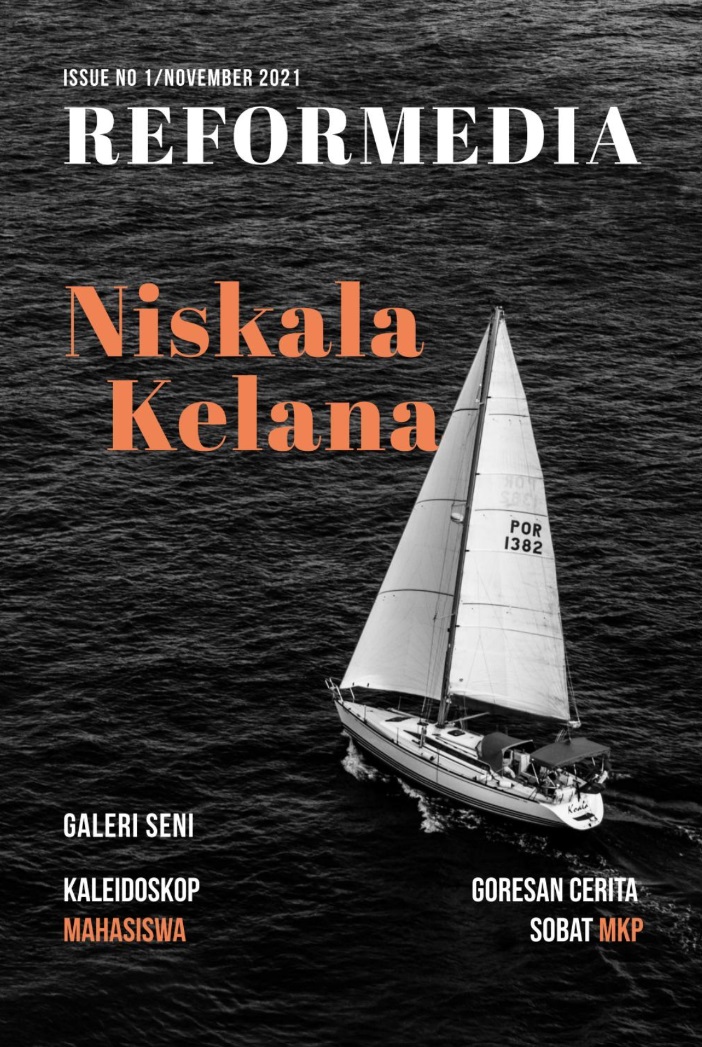
It is Gamapi’s annual magazine, which contains the works of MKP students and a collection of highlights of Gamapi events during the year.
Freedom to Learn – Independent Campus
No. | Activity | Period |
ODD SEMESTER | ||
MBKM Registration: | ||
Internship | Mei – Juli | |
Research | Conditional | |
IISMA | Maret – April | |
PMM | April – Mei | |
2. | MBKM Selection: | |
Internship | Mei – Juli | |
IISMA | April – Mei | |
PMM | Juni | |
3. | MBKM Announcement: | |
Internship | Mei – Juli | |
IISMA | Mei | |
PMM | Juni | |
4. | MBKM Registration | Juli – Awal Agustus |
5. | Implementation of MBKM | September – Januari |
6. | Result reporting / Value conversion | Januari – Februari |
EVEN SEMESTER | ||
1. | MBKM Registration: | |
Internship | November – Desember | |
Research | Conditional | |
Social Entrepreneurship | Conditional | |
2. | MBKM Selection: Internship | November – Desember |
3. | MBKM Announcement: Internship | November – Desember |
4. | MBKM Registration | Januari – Awal Februari |
5. | Implementation of MBKM | Februari – Juni |
6. | Result reporting / Value conversion | Juni – Juli |
DPPM Internship Guide: Booklet Magang-1.pdf
DPPM research guide: Booklet Riset.pdf
DPPM student exchange guide: Booklet Pertukaran Mahasiswa-1.pdf
DPPM social entrepreneurship guide: Booklet Kewirausahaan Sosial-1.pdf
Email: mbkm-mkp.fisipol@ugm.ac.id (Subject email: Consultation_Student Name)
Internal Internship
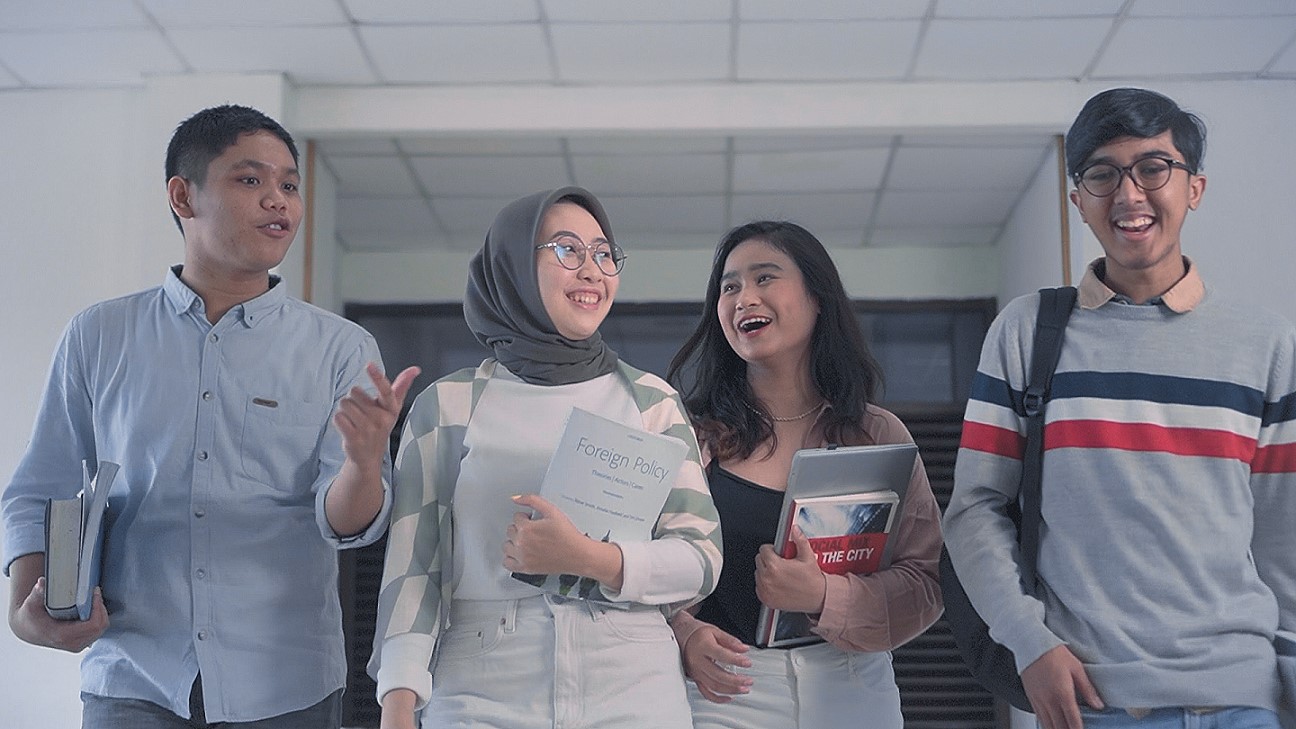
The Undergraduate Program of the Department of Public Policy and Management facilitates its active undergraduate students to develop interests and talents, academic and non-academic alike, through an internal internship. This internship program provides opportunities for students to interact directly with the lecturers, researchers, teaching staff, and other students across different batches. In addition, these programs are designed to enable students to build communication and develop networking with the alumni of DPPM and FISIPOL UGM.
Undergraduate students undertake three main programs during this internal internship:
In the research program, student interns are encouraged to develop their critical thinking skills, analyze current issues, and evaluate the urgency of an issue. Students are allowed to pick their topic and research outputs based on the mutual agreement within their teams.
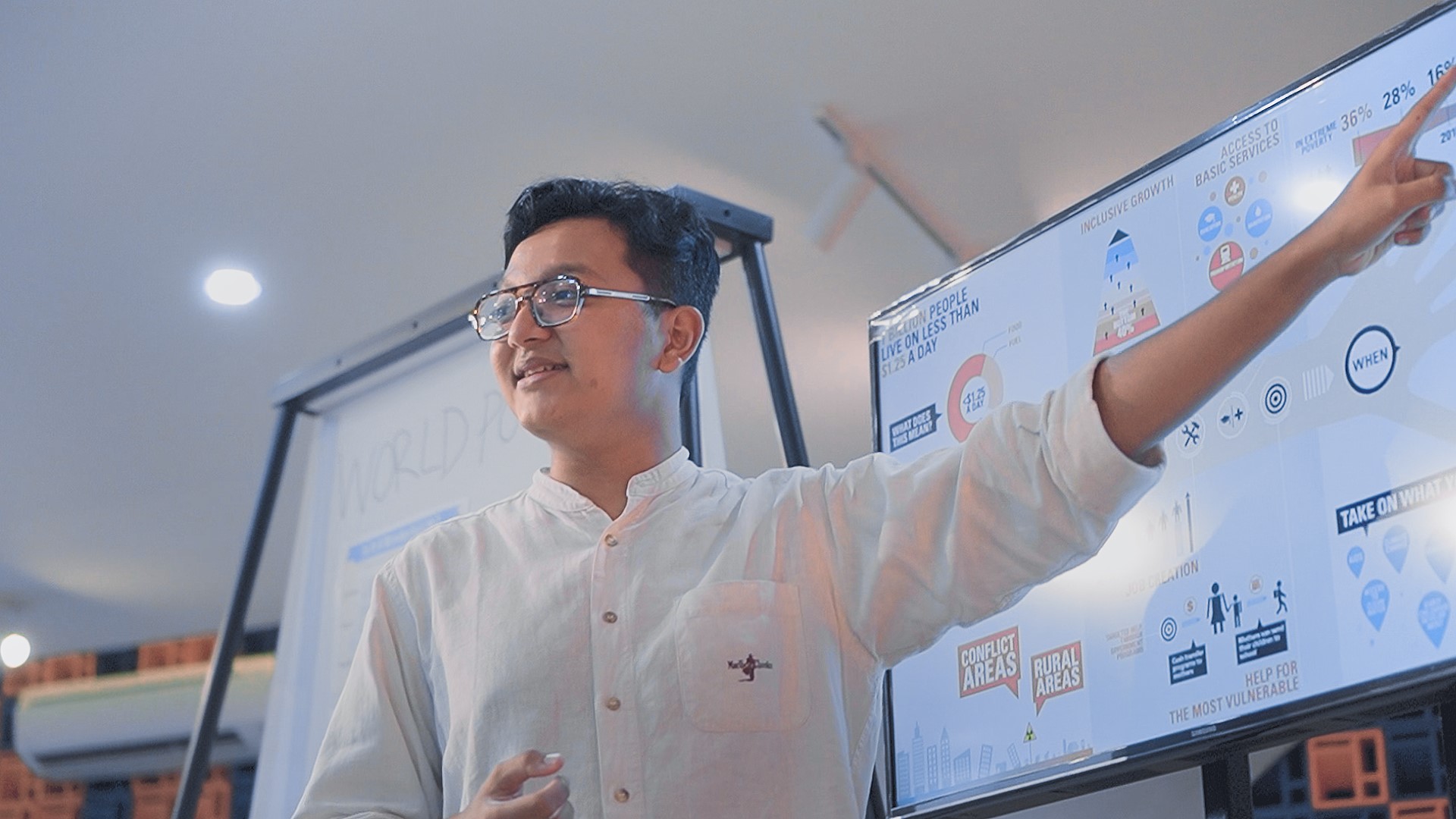
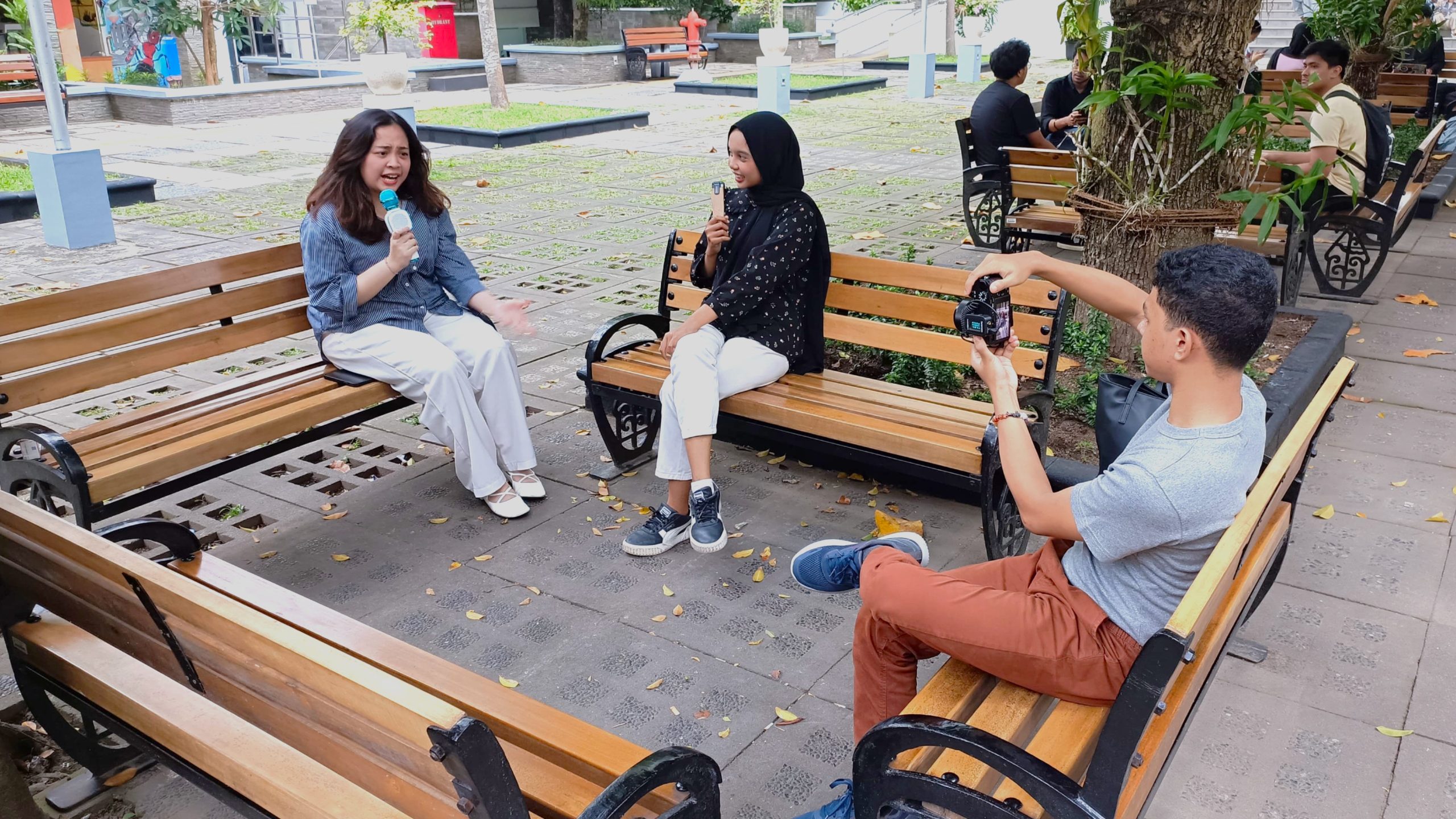
The media content program teaches students to develop ideas and think creatively, manage relationships and cooperation with numerous parties, and learn basic copywriting skills. The main outputs of the media content program include #gettoknow Alumni, #gettoknow Dosen, #gettoknow Mata Kuliah, and other types of content.
Finally, the managerial program is a joint program between the Undergraduate Program and the Learning Development Team of the Department of Public Policy and Management. Student interns are involved in managing and assisting the hybrid learning processes of the Undergraduate Program.
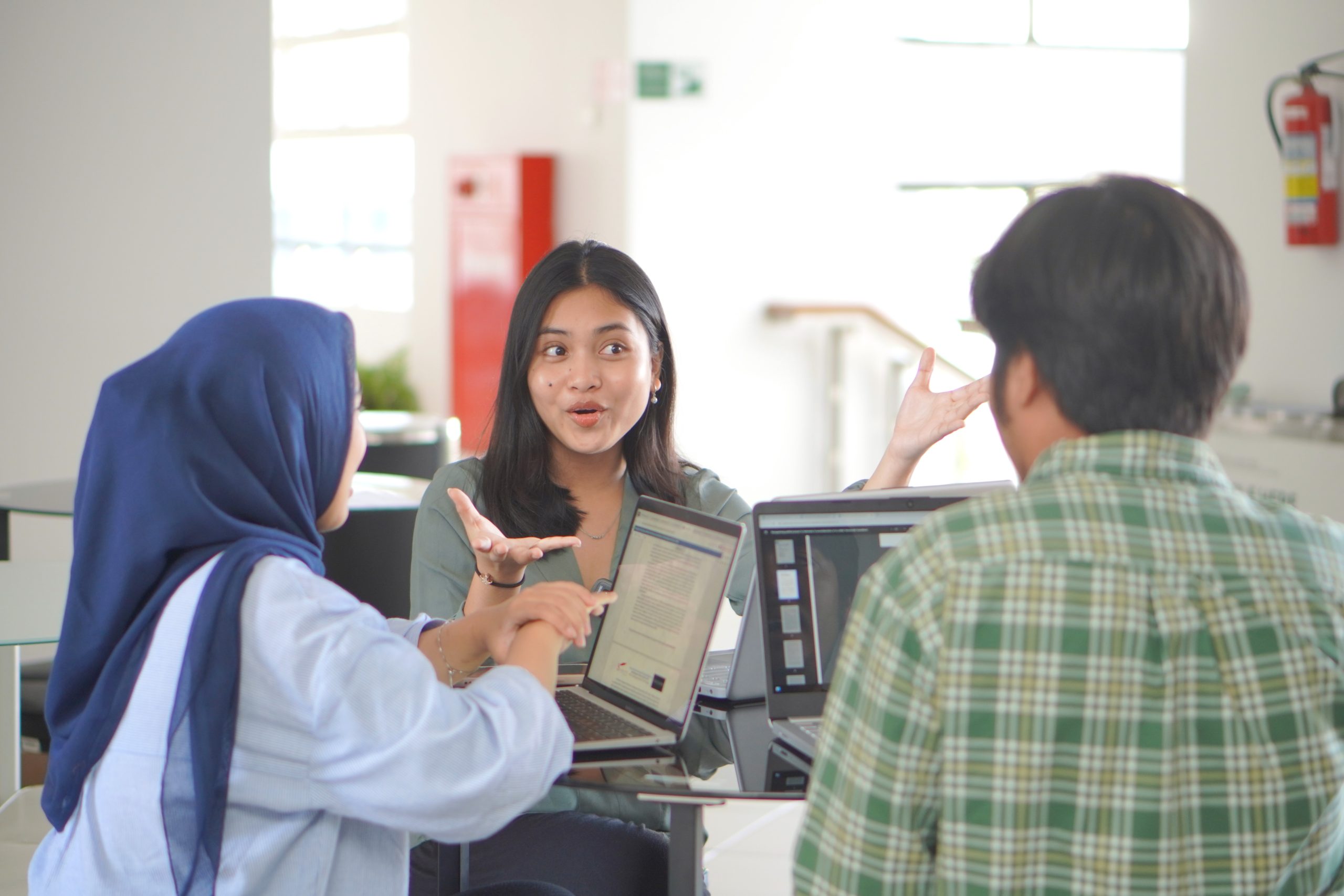
The internal internship of the undergraduate program is open twice a year at the beginning of each semester (January and June). The length of the internship is one to three months on the basis of the mutual agreement between students and the internship supervisors.
Graduation Requirement Activity
Batch
2022
and new
Batch
2021
Batch
2020
Batch
2019
Document forms for applicable activity reporting:
1. Latest CV containing the proposed activity
2. Valid certificate of activity
3. Photo evidence or other supporting documents deemed necessary, such as: activity posters, proceeding papers, soft copies or DOIs of published articles.
If students cannot show the certificate due to certain reasons, they can report to the respective Study Program Admin.
S1 Regular: +628157950986 (Mbak Yuli)
S1 IUP: +6281325115665 (Mbak Iik)

